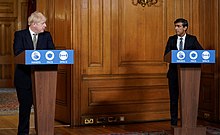This article needs to be updated. The reason given is: more information needed on policies and lifting of restrictions in 2021. (September 2021) |

| Part of a series on the |
| COVID-19 pandemic |
|---|
 |
|
|
|
| Part of a series on the |
| COVID-19 pandemic in the United Kingdom, British Overseas Territories and Crown Dependencies |
|---|
 |
| (Part of the global COVID-19 pandemic) |
In response to the COVID-19 pandemic in the United Kingdom, the UK Government introduced various public health and economic measures to mitigate its impact. Devolution meant that the four nations' administrative responses to the pandemic differed; the Scottish Government, the Welsh Government, and the Northern Ireland Executive produced different policies to those that apply in England. Numerous laws were enacted or introduced throughout the crisis.
The UK government had developed a pandemic response plan in previous years. In response to the first confirmed COVID-19 cases in January 2020, the UK introduced advice for travellers coming from affected countries in late January and February 2020, and began contact tracing, although this was later abandoned.[1] The government incrementally introduced further societal restrictions on the public as the virus spread across the country in the following weeks, initially resisting more stringent measures introduced elsewhere in Europe and Asia.[2] Prime Minister Boris Johnson announced the first national lockdown on 23 March 2020 and Parliament introduced the Coronavirus Act 2020, which granted the devolved governments emergency powers and empowered the police to enforce public health measures.[3]
As the governments began lifting the nationwide stay-at-home order, policies and approaches diverged between the four nations. The Scottish government uniquely pursued an elimination strategy. Across the country, localised lockdowns, social distancing measures, self-isolation laws for those exposed to the virus and rules on face masks were introduced (though certain exemptions were permitted),[4] as well as efforts to expand COVID-19 testing and tracing. In autumn and winter 2020, further nationwide lockdowns were introduced in response to a surge in COVID-19 cases and the Alpha variant. A COVID-19 vaccination programme began in December 2020. In mid-2021, the government lifted most restrictions during the third wave driven by the Delta variant, until the "winter plan" reintroduced some rules in response to the Omicron variant in December that year. Remaining restrictions were lifted in England from 24 February 2022 under a "living with COVID" plan announced by the government on that date. Economic support was provided to struggling businesses and to furlough employees to mitigate the severe economic impact. It also forwent the procurement process in contracts in response to shortages of PPE and medical equipment, major issues in the early months of the outbreak, and for developing a contact tracing app.
The UK government's response to the pandemic, in particular the timeliness of public health measures being introduced and lifted, has faced criticism from academic medical sources, media outlets, relatives of COVID-19 patients and various political figures. This criticism continued amid the Partygate scandal, as multiple government officials were revealed to have breached COVID-19 social distancing restrictions during lockdowns, including Johnson and the Chancellor of the Exchequer Rishi Sunak. A public inquiry into the response was established in June 2022.
- ^ Cite error: The named reference
Kobiewas invoked but never defined (see the help page). - ^ Cite error: The named reference
:9was invoked but never defined (see the help page). - ^ Cite error: The named reference
x31was invoked but never defined (see the help page). - ^ "Face mask exemption card: How do you prove you cannot wear a covering? | The Independent".
